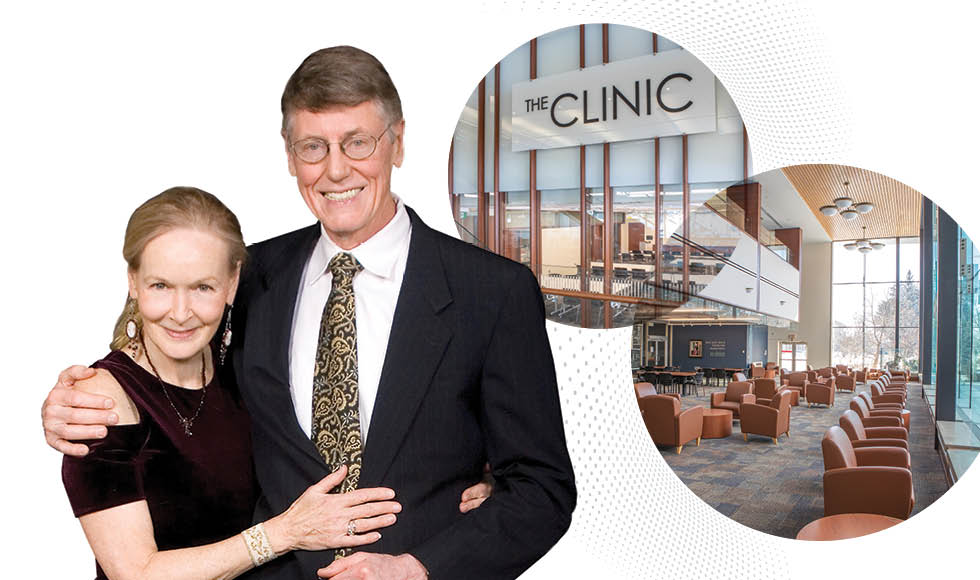Heersink $32M gift boosts McMaster’s biomedical and global health innovation

The gift will create the Marnix E. Heersink School of Biomedical Innovation and Entrepreneurship to educate the next generation of entrepreneurial health innovators.
February 1, 2022
A donation of more than $32 million Cdn from Marnix Heersink, an Alabama physician and entrepreneur, will boost McMaster University’s role as a hub for biomedical innovation, entrepreneurship and global health.
The gift will create the Marnix E. Heersink School of Biomedical Innovation and Entrepreneurship to educate the next generation of entrepreneurial health innovators.
“I think McMaster is the perfect place to make this donation because of its well-earned reputation in innovative health care learning and research,” said Heersink, who was born in the Netherlands and grew up in Burlington, Ontario. After graduating as a physician, he moved to Alabama where he has a successful career as an ophthalmologist and business leader.
“Health care, innovation and entrepreneurship go hand-in-hand. We’ve seen how McMaster encourages this trend and I was inspired. The possibility of amplifying health-care innovation beyond McMaster is what motivates me to make this donation, which I consider an investment in the creation of more opportunities for others.”
A portion of the gift will create the Mary Heersink Centre for Global Health, named for his wife, to create new solutions addressing emerging trends and threats to global health, such as pandemics and the climate crisis.
Mary Heersink, a food security author and advocate, is a founding member of the international advisory board for McMaster’s Global Health Graduate Program, which includes a consortium of universities in the Netherlands, India, Thailand, Norway, Colombia and Sudan.
“The problem-based learning model that came out of McMaster University’s pioneering work is now embraced across the world, and it is a proven entity that has already transformed medical education,” she said.
“The COVID-19 pandemic has underscored we need a new way of teaching healthcare workers and new approaches to public health in the global arena. The pandemic stretches beyond the physical and medical to the economic, psychosocial and educational disruptions that cut across all societies and boundaries,” she added.
This holistic approach to the pandemic mirrors the university’s expertise in infectious disease and Canada’s Global Nexus for Pandemics and Biological Threats established at McMaster in 2020.
David Farrar, McMaster’s president and vice-chancellor said, “We are very grateful for this major gift from Marnix and Mary Heersink, which will allow us to cement the link between cutting-edge biomedical science and entrepreneurial activity, helping McMaster to lay the foundations for a new innovation ecosystem right here in Hamilton.”
Paul O’Byrne, dean and vice-president of McMaster’s Faculty of Health Sciences added: “I would like to sincerely thank Marnix and Mary Heersink for this game-changing gift. This will significantly expand McMaster and our Faculty’s established international reputation for continuous innovation in health sciences research and education.”
The Marnix E. Heersink School of Biomedical Innovation and Entrepreneurship will be based at the Michael G. DeGroote Centre for Learning and Discovery on McMaster’s main campus, and in the future, it will be housed in a new purpose-built building, as McMaster develops Canada’s Global Nexus for Pandemics and Biological Threats.
The gift totals $25 million US, or more than $32 million Cdn. These funds will support the creation of the school; the establishment of two endowed professorial chairs in biomedical innovation and in biomedical entrepreneurship; a development fund for innovation and commercialization as well as $5 million Cdn funding for the new Global Nexus building, a contribution being matched by the university. It also includes the funding for the Mary Heersink Centre for Global Health.
In September 2021, the University of Alabama at Birmingham (UAB) received $95 million US from Marnix and Mary Heersink. Subsequently the University of Alabama School of Medicine announced its name would become the Marnix E. Heersink School of Medicine.
The UAB is now in the process of creating the Marnix E. Heersink Institute of Biomedical Innovation and the Mary Heersink Institute for Global Health. These two major new programs at UAB will complement and work with the matching programs at McMaster.
“Great ideas like this happen when the time is right,” said John Kelton, a McMaster distinguished university professor of medicine and a long-time friend of the Heersinks.
“The previous donations from Mr. Michael G. DeGroote allowed us to lay the foundation for this current Heersink gift.
“It also takes a supportive institution for a great idea to happen, and both President David Farrar and the Faculty’s Dean and Vice-President Paul O’Byrne are saying the time is now right to enhance the culture of innovation and entrepreneurship at McMaster University.”
Kelton added: “This donation can be considered an investment that will spawn a hub of biomedical innovation in both Hamilton and Birmingham, with hives of start-up companies manufacturing life-saving medical products.
“This will completely reimagine both cities’ post-industrial economies, just like computers and the internet kick-started Silicon Valley and transformed California’s economic fortunes.”
Kelton was the dean and vice-president of the health sciences faculty when Marnix Heersink and his brothers John, Ewout and Ben helped fund the 2007 addition of the two-storey, light-filled Jan and Mien Heersink Reading Pavilion of McMaster’s Health Sciences Library, named for their parents. Mary and Marnix Heersink have also supported the development of The Clinic, a new space at McMaster’s Faculty of Health Sciences dedicated to the creation of health entrepreneurs.
Andrea Baumann, associate vice-president of McMaster’s Global Health Office, said: “The Mary Heersink Global Health donation provides much needed support for McMaster and our consortium of university partners to continue leading and transforming research, education and service in the transdisciplinary field of global health.”


